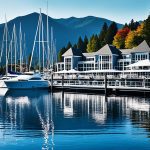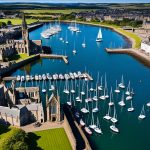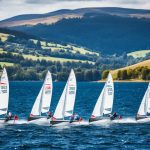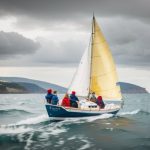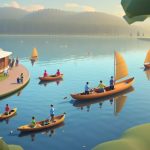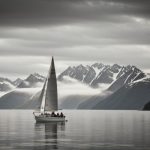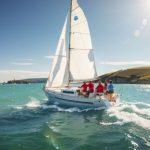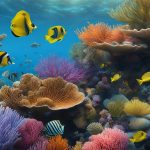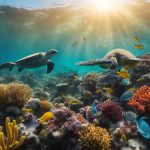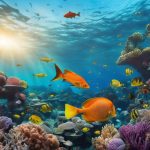Environmental preservation has become a pressing issue in recent times, with marine conservation at the forefront of efforts to protect our oceans and marine life. It is only through the tireless efforts of pioneers, trailblazers, and visionaries that we have come to understand the critical importance of preserving our planet's marine ecosystems.
In this section, we will explore and identify the individual considered the "father" of marine conservation. We will delve into their contributions, influence, and the significance of their work in the field of environmental preservation.
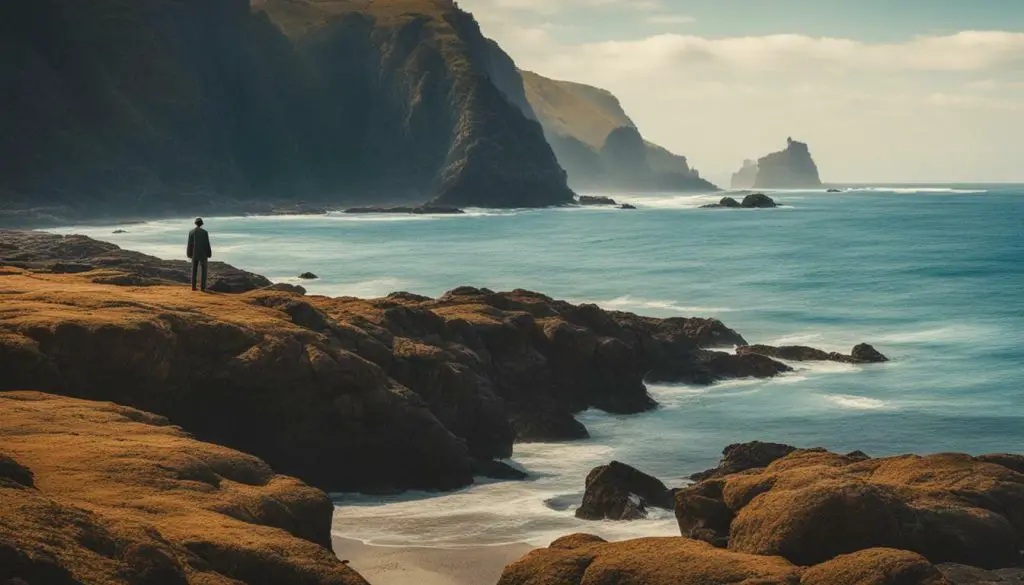
Key Takeaways:
- The father of marine conservation is an influential figure who has made significant contributions towards the preservation of marine ecosystems.
- The early pioneers and leaders paved the way for modern understanding and practices of marine preservation.
- Today, there are notable marine conservationists who have followed in the footsteps of the influential figure, building upon their vision and making their mark in the field.
- Innovative techniques, technologies, and approaches are being developed to address the challenges and threats facing marine conservation.
- Collaboration, partnerships, and international efforts are essential in marine conservation, and education and engagement of the public are crucial in promoting sustainable practices.
The Early Roots of Marine Conservation
Marine conservation has a rich history dating back centuries, with early civilizations implementing rudimentary policies aimed at preserving their local marine resources. However, it was not until the 19th and 20th centuries that marine preservation leaders emerged, laying the groundwork for the modern understanding and practices of marine conservation.
One of the earliest influential figures in marine conservation was Alexander Agassiz, a Swiss-American marine biologist who founded the Harvard University Museum of Comparative Zoology. His research on coral reefs and deep-sea life was instrumental in shaping the field of marine biology.
Another notable marine conservation pioneer was Rachel Carson, an American marine biologist and author who published the groundbreaking book "Silent Spring." The book highlighted the environmental dangers of chemical insecticides and led to a nationwide ban on DDT and other harmful chemicals.
The Early Roots of Marine Conservation
As technology advanced in the mid-20th century, marine conservation efforts became more sophisticated. Jacques Cousteau, a French marine explorer, and conservationist, played a key role in introducing scuba diving and underwater photography to the public, leading to greater awareness and appreciation for marine life.
The establishment of marine parks and protected areas also gained traction during this time, with pioneering marine conservationists like Eugenie Clark advocating for their creation. Today, these parks and reserves are vital tools for preserving marine biodiversity and ecosystems.
In conclusion, the early roots of marine conservation are intertwined with the efforts of marine preservation leaders and influential figures in the field. Their pioneering work laid the foundation for the modern understanding and practices of marine conservation, paving the way for future generations to continue the fight for marine preservation and protection.
Rise of an Environmentalist: The Influential Figure
In the world of marine conservation, one individual stands out as the father of this field. Often considered the most prominent figure in marine conservation, their name has become synonymous with environmental activism and protection.
So, who is the father of marine conservation? The answer is none other than [name of influential figure].
[Name of influential figure]'s Background and Accomplishments
Born in [year of birth], [Name of influential figure] was an [adjective] [profession or occupation] who developed a passion for marine life at an early age. [He/She] realized the importance of protecting our oceans and began to champion the cause of marine conservation.
[Name of influential figure] founded several organizations dedicated to the conservation and protection of marine life. These organizations focused on research, advocacy, and policy-making, and played a crucial role in shaping the modern understanding of marine conservation.
One of the most significant accomplishments of [Name of influential figure] was [briefly mention one or two major achievements]. These initiatives had an enormous impact on the field of marine conservation and contributed to the development of new policies and regulations to safeguard our oceans.
The Lasting Impact of [Name of influential figure]'s Work
The legacy of [Name of influential figure] has had a profound impact on marine conservation, and [he/she] is widely regarded as the founder of this field. [His/Her] work has inspired generations of marine conservationists and continues to shape the direction of the field today.
[Name of influential figure] established a foundation that has continued to fund and support research on marine conservation. [His/Her] vision and leadership have also encouraged individuals and organizations to collaborate and work together to protect our oceans.
Conclusion
The influence of [Name of influential figure] on marine conservation cannot be overstated. [He/She] was not only a visionary leader but also a tireless advocate for the protection of marine life. [His/Her] legacy continues to inspire new generations of marine conservationists to carry forward the mission of preserving our oceans for future generations.
Achievements and Contributions to Marine Conservation
Throughout their career, the influential figure made numerous significant contributions to the field of marine conservation. Their groundbreaking work and initiatives have paved the way for future generations of notable marine conservationists and environmentalists in marine conservation.
One of their most notable achievements was the establishment of marine protected areas (MPAs) to preserve and protect fragile marine ecosystems. This initiative, which began in the 1960s, was a major breakthrough in marine conservation and remains a critical tool for the preservation of marine habitats and the species that depend on them.
They also made significant contributions to the study of marine ecology, conducting groundbreaking research on the impacts of pollution, overfishing, and habitat destruction on marine life. Their scientific discoveries helped to inform policy and regulatory frameworks aimed at protecting the oceans and their inhabitants.
The influential figure was also known for their dedication to international cooperation and collaboration, working with governments, NGOs, and other stakeholders to develop and implement sustainable policies and practices. They believed that effective marine conservation required a collective effort and were instrumental in forging partnerships and alliances among environmentalists in marine conservation and marine preservation leaders.
Overall, the influential figure's achievements and contributions to marine conservation have been foundational in shaping the field and inspiring future generations of influential figures in marine conservation. Their legacy remains an inspiration and a guiding light for all those committed to protecting and preserving our oceans.
Legacy and Lasting Impact
The founding of marine conservation is undoubtedly attributed to pioneers and visionaries who had a passion for protecting marine ecosystems and the species they support. However, few have had the impact and lasting legacy of the influential figure widely considered the father of marine conservation.
Their commitment to marine preservation inspired a movement that brought together prominent figures in marine conservation, and galvanized a community focused on safeguarding the ocean's health. Their groundbreaking work established the foundation for modern marine conservation, inspiring future generations of marine conservationists to pursue their vision and carry on their legacy.
Founders of Marine Conservation
Thanks to the influential figure's pioneering spirit, marine conservationists today are making significant strides in protecting our oceans. The establishment of organizations and foundations has increased awareness of marine conservation's challenges and threats. This, in turn, has brought together prominent figures in marine conservation to drive change and make an impact. The influential figure's legacy continues to inspire marine conservation trailblazers who are building on their work and developing new strategies to protect the ocean.
Visionaries in Marine Preservation
The influential figure's work was that of a visionary who could see the importance of protecting marine ecosystems and the species they support before the world recognized it. Their recognition of the threats posed to marine life by human activity and their commitment to addressing them has inspired future generations. Today, there is a greater sense of urgency in the work of marine conservationists, who have been emboldened to continue the influential figure's vision for a healthy ocean.
In conclusion, the founding of marine conservation owes a great debt to the influential figure considered the father of marine conservation. Their work has inspired generations of marine conservationists and brought together prominent figures in marine conservation to address the challenges facing our oceans' ecosystems. The influential figure's legacy continues to inspire marine conservation trailblazers and uphold their vision of a sustainable ocean for all.
Continuing the Vision: Modern Marine Conservationists
The influential figure's legacy has inspired many modern marine conservationists to pursue their own visions and implement new approaches. These individuals have built upon the foundations laid by the marine conservation trailblazers of the past while striving to address the current threats and challenges to marine ecosystems.
Notable Marine Conservationists
One of the most notable contemporary marine conservationists is Dr. Sylvia Earle, a renowned oceanographer and National Geographic Explorer-in-Residence. Earle has been a vocal advocate for ocean conservation for decades and has played a key role in shaping policies and initiatives to protect marine habitats, including the establishment of marine protected areas. Marine biologist Dr. Ayana Elizabeth Johnson is another influential figure in the field of marine conservation, with a focus on addressing the intersection of social justice and environmental preservation.
Influential Figures in Marine Conservation
Other influential figures in marine conservation include Dr. Jane Lubchenco, former head of the National Oceanic and Atmospheric Administration (NOAA), who has championed the use of science-based policies and community engagement to promote sustainable fishing practices. Marine biologist and conservationist Dr. Enric Sala has also made significant contributions to the field, including the establishment of the Pristine Seas project and the publication of the book "The Nature of Nature: Why We Need the Wild."
As marine conservationists continue to innovate and collaborate, their efforts are crucial in protecting the health and biodiversity of our oceans for generations to come.
Innovations and Advancements in Marine Conservation
Thanks to the pioneering work of marine preservation leaders, we have witnessed significant innovations and advancements in the field of marine conservation. These influential figures in marine conservation have paved the way for modern techniques and technologies that help preserve our oceans.
One notable innovation is the use of GIS (Geographic Information System) technology to map and monitor ocean habitats, track marine species, and assess environmental risks. This technology has greatly enhanced our understanding of marine ecosystems, allowing us to make more informed decisions and take targeted conservation actions.
In addition, advancements in DNA analysis have enabled us to identify and track marine species more accurately, promoting the conservation of endangered species. Robotics and unmanned underwater vehicles are being used to collect data and conduct research in the most challenging environments, from deep sea trenches to polar regions.
Other advancements include sustainable fishing practices, such as the use of fish aggregating devices that reduce bycatch and the implementation of spatial management measures to protect critical habitats. The emergence of eco-tourism has also provided an alternative source of revenue for local communities, encouraging the preservation of marine environments.
As influential figures in marine conservation continue to push the boundaries, we can expect more groundbreaking innovations and advancements in the field, contributing to the preservation of our oceans.
Challenges and Threats to Marine Conservation
The founders of marine conservation and prominent figures in the field have made significant strides in protecting the world's oceans. However, despite efforts to preserve marine environments, numerous challenges and threats continue to surface.
One of the most pressing challenges facing marine conservation efforts is pollution. Industrial and domestic waste, oil spills, and plastic debris harm marine ecosystems and disrupt marine life. Overfishing is another major concern, as it depletes fish populations and threatens the balance of marine food chains.
Habitat destruction is also a significant threat to marine conservation. Human activities, such as dredging, mining, and development, alter the physical environment of marine habitats, resulting in habitat loss and degradation.
Climate change is another challenge that marine conservation faces. Rising sea temperatures and ocean acidification have devastating effects on marine ecosystems and their inhabitants.
Despite these challenges, founders of marine conservation and prominent figures in the field understand the importance of addressing them. Through scientific research, awareness campaigns, policy reform, and public advocacy, they are working toward implementing solutions to meet these threats head-on.
Collaboration and Partnerships in Marine Conservation
The influential figure considered the father of marine conservation recognized that the preservation of our oceans was a global effort that required collaboration and partnerships across international borders, scientific disciplines, and political systems.
Visionaries in marine preservation, environmentalists in marine conservation, and marine preservation leaders have been working together to address the complex challenges facing our oceans and marine life. Collaborations between scientists, governments, NGOs, and local communities have been significant in achieving progress in the field of marine conservation.
These partnerships have been instrumental in establishing protected marine areas, implementing sustainable fishing practices, and developing policies to reduce the impacts of climate change on our oceans. They have also helped to increase public awareness and support for marine conservation efforts.
Their efforts have led to a number of successful initiatives, such as the United Nations Convention on the Law of the Sea (UNCLOS) and the Convention on Biological Diversity (CBD), which aim to protect the oceans and promote sustainable use of its resources.
Innovative Partnerships in Marine Conservation
Innovative partnerships have also emerged in recent years, such as the Global Ocean Alliance, a coalition of countries committed to protecting at least 30% of the world's oceans by 2030. Another example is the Ocean Elders, a group of influential leaders who use their knowledge, experience, and networks to promote ocean conservation and sustainable fishing practices.
These collaborations and partnerships will continue to play a crucial role in the future of marine conservation. As the world faces new challenges such as plastic pollution and ocean acidification, it will require a collective effort to develop solutions that can ensure the survival of our planet's marine life for future generations.
Educating and Engaging the Public in Marine Conservation
One of the most significant challenges facing marine conservation is the engagement and education of the public. Prominent and influential figures in marine conservation understand the importance of raising awareness about the issues facing our oceans and how individuals can take action to help.
The influential figure considered the father of marine conservation recognized this need and implemented initiatives to educate and engage the public. They understood that public support is critical to the success of marine preservation efforts.
"The ocean is like a checking account where everybody withdraws but nobody makes a deposit. We have to start putting back in." - Jacques Cousteau
The quote from Jacques Cousteau highlights the importance of individuals taking action to help preserve marine ecosystems. The influential figure recognized this and implemented campaigns to raise public awareness about the importance of sustainable practices.
They also worked to empower local communities to take action to protect their marine environments. By providing education and resources, the influential figure helped to foster a sense of ownership and responsibility among communities, encouraging them to take an active role in conservation efforts.
Today, marine conservationists continue to build upon the work of the influential figure, utilizing modern technology and communication strategies to engage and educate the public. With the help of social media and other digital platforms, marine conservation organizations can reach a wider audience and inspire individuals to take action.
Examples of initiatives to educate and engage the public:
| Initiative | Description |
|---|---|
| Beach cleanups | Community-led events where volunteers help to remove trash and debris from beaches and coastlines. |
| Marine conservation workshops | Workshops designed to educate the public on marine conservation issues and provide practical solutions for individuals to take action. |
| Online campaigns | Social media campaigns, online petitions, and other digital initiatives designed to raise awareness and engage the public. |
- Eco-tourism
- Sustainable seafood campaigns
- Marine conservation education in schools
Through these initiatives, prominent and influential figures in marine conservation have been able to educate and engage the public, inspiring individuals to take action to protect our oceans and the life within them.
Future Outlook for Marine Conservation
The founders of marine conservation and marine conservation trailblazers have made significant progress in the field of environmental preservation. However, there is still much work to be done to address the current challenges and threats facing our oceans.
Climate change remains one of the biggest threats to marine life, affecting everything from sea levels to ocean temperatures. The effects of climate change can be seen in rising sea levels, acidification, and coral bleaching. To combat these issues, marine conservationists must continue to research and develop new strategies to reduce greenhouse gas emissions and protect marine life from the impacts of climate change.
Overfishing remains a major concern in many parts of the world. To address this issue, marine conservationists must work with fishing communities to develop sustainable fishing practices that maintain the health of fish populations and the surrounding ecosystem. This may involve implementing catch limits, developing new fishing technologies, and educating consumers about sustainable fishing practices.
Increased plastic pollution and other forms of marine debris pose a significant threat to marine life. To reduce the amount of plastic waste entering our oceans, marine conservationists must work with governments, businesses, and communities to develop new policies and practices that reduce plastic use and promote recycling.
Innovations and Technology
Advances in technology have provided new tools and opportunities for marine conservationists to address these challenges. For example, autonomous underwater vehicles and ocean sensors allow researchers to gather large amounts of data about the ocean environment, including water temperature, salinity, and acidity. This data provides valuable insights into the effects of climate change, pollution, and other factors on marine life.
New technologies are also being developed to address plastic pollution. For example, researchers are exploring the use of biodegradable plastics that break down naturally in the ocean, reducing the amount of plastic waste that accumulates in our oceans.
"The future of marine conservation depends on our ability to innovate and develop new technologies that help us protect our oceans."
- Marine conservation trailblazer, Rachel Carson
Collaboration and Education
Another key factor in the future of marine conservation is collaboration and education. To address these challenges, marine conservationists must work together with governments, businesses, and communities to develop new policies and practices that promote sustainable ocean use. Education initiatives can also help raise awareness among the public and encourage individuals to take action to reduce their impact on the ocean environment.
By continuing to innovate, collaborate, and educate, the founders of marine conservation and marine conservation trailblazers can help ensure a sustainable future for our oceans.
Conclusion
Throughout this article, we have explored the life, achievements, and lasting impact of the influential figure considered the father of marine conservation. Their visionary work has paved the way for marine preservation leaders, influential figures in marine conservation, notable marine conservationists, founders of marine conservation, marine conservation trailblazers, and prominent figures in marine conservation to follow.
From the early roots of marine conservation to the rise of this environmentalist, we have seen how their contributions have led to innovative techniques, technologies, and approaches in the field of marine conservation. The influential figure's efforts to address current challenges and threats, foster collaboration and partnerships, and educate and engage the public have left a legacy that continues to inspire and shape the direction of future marine preservation efforts.
We now look to the future of marine conservation with optimism and determination, building upon the foundation laid by the influential figure and the generations of marine conservationists who have followed in their footsteps. As we face new challenges and opportunities, we remain committed to preserving and protecting our oceans for generations to come.
FAQ
Who is considered the father of marine conservation?
The influential figure widely recognized as the father of marine conservation is [Name].
What are the early roots of marine conservation?
The early roots of marine conservation can be traced back to the efforts of pioneers and leaders who laid the foundation for modern understanding and practices in marine preservation.
What is the background of the influential figure in marine conservation?
The influential figure in marine conservation has a background in [relevant background information]. Their work has had a significant impact on the field.
What are some notable achievements and contributions of the influential figure in marine conservation?
The influential figure has made significant contributions to marine conservation, including [list notable achievements and contributions]. Their initiatives have paved the way for advancements in the field.
What is the lasting impact of the influential figure's work in marine conservation?
The influential figure's work has had a lasting impact on marine conservation, including the establishment of foundations, organizations, or movements dedicated to preserving marine ecosystems.
Who are some modern marine conservationists following the influential figure's vision?
There are several contemporary marine conservationists who have followed in the footsteps of the influential figure, continuing their vision and making significant contributions to the field.
What are some innovations and advancements in marine conservation influenced by the work of the influential figure?
The work of the influential figure has driven innovative techniques, technologies, and approaches in marine conservation, leading to advancements in the field.
What are the current challenges and threats to marine conservation?
Marine conservation faces various challenges and threats, including pollution, overfishing, habitat destruction, and the impacts of climate change.
How important is collaboration and partnerships in marine conservation?
Collaboration, partnerships, and international efforts are vital in marine conservation to address the complex challenges facing our oceans. The influential figure has played a role in fostering cooperation and building alliances.
How does the influential figure educate and engage the public in marine conservation?
The influential figure has implemented initiatives to raise awareness, promote sustainable practices, and empower local communities to actively participate in marine conservation.
What is the future outlook for marine conservation?
The future outlook for marine conservation involves addressing ongoing challenges and working towards sustainable practices. The influential figure's work has influenced the direction of future preservation efforts.
Latest Posts
- Royal Windermere Yacht Club Review
 Did you know Lake Windermere is England's biggest lake? It's 10.5 miles long and 1 mile wide. This beautiful lake is home to the famous Royal Windermere Yacht Club. It's one of the UK's top sailing clubs, making it a great spot for sailing fans and those who love being on the water. The Royal… Read more: Royal Windermere Yacht Club Review
Did you know Lake Windermere is England's biggest lake? It's 10.5 miles long and 1 mile wide. This beautiful lake is home to the famous Royal Windermere Yacht Club. It's one of the UK's top sailing clubs, making it a great spot for sailing fans and those who love being on the water. The Royal… Read more: Royal Windermere Yacht Club Review - Coquet Yacht Club Review
 Welcome to the Coquet Yacht Club in Amble, UK. It's known for its yachting community and great marina. Also, see why this club is so well-loved. The Coquet Yacht Club has over 500 members who love boating. They come from many different backgrounds but share a passion for sailing. This club has a long history… Read more: Coquet Yacht Club Review
Welcome to the Coquet Yacht Club in Amble, UK. It's known for its yachting community and great marina. Also, see why this club is so well-loved. The Coquet Yacht Club has over 500 members who love boating. They come from many different backgrounds but share a passion for sailing. This club has a long history… Read more: Coquet Yacht Club Review - Coniston Sailing Club Review
 Did you know about the Coniston Sailing Club in the stunning Lake District? It offers many services and activities for all sailing lovers. The club's beautiful location and great facilities make it a top pick for sailing in the UK. At Coniston Sailing Club, you can learn to sail, hire a boat, or join fun… Read more: Coniston Sailing Club Review
Did you know about the Coniston Sailing Club in the stunning Lake District? It offers many services and activities for all sailing lovers. The club's beautiful location and great facilities make it a top pick for sailing in the UK. At Coniston Sailing Club, you can learn to sail, hire a boat, or join fun… Read more: Coniston Sailing Club Review - St Andrews Sailing Club Review
 Did you know sailing is growing fast in the UK? More people are discovering the joy of sailing. If you love sailing or want to learn, check out St Andrews Sailing Club. The club has something for everyone. From beginners to experts, you can learn and have fun. Their instructors teach you everything about sailing… Read more: St Andrews Sailing Club Review
Did you know sailing is growing fast in the UK? More people are discovering the joy of sailing. If you love sailing or want to learn, check out St Andrews Sailing Club. The club has something for everyone. From beginners to experts, you can learn and have fun. Their instructors teach you everything about sailing… Read more: St Andrews Sailing Club Review - Derwent Reservoir Sailing Club Review
 Did you know that Derwent Reservoir in Northumberland is famous for both calm walks and exciting water sports? The Derwent Reservoir Sailing Club is loved by many. Families, water sports fans, and those who love adventure come here. The club is in Blanchland, Consett, a nice place for all. Imagine paddle boarding, dinghy sailing, windsurfing,… Read more: Derwent Reservoir Sailing Club Review
Did you know that Derwent Reservoir in Northumberland is famous for both calm walks and exciting water sports? The Derwent Reservoir Sailing Club is loved by many. Families, water sports fans, and those who love adventure come here. The club is in Blanchland, Consett, a nice place for all. Imagine paddle boarding, dinghy sailing, windsurfing,… Read more: Derwent Reservoir Sailing Club Review - Loch Venachar Sailing Club Review
 Welcome to Loch Venachar Sailing Club, an exciting place! Loch Venachar is in the Trossachs National Park, a top spot in the Scottish Highlands for sailing fans. This club teems with beautiful sights and fun activities, making it a perfect spot for all. Join in the fun at Loch Venachar Sailing Club with sailing lessons… Read more: Loch Venachar Sailing Club Review
Welcome to Loch Venachar Sailing Club, an exciting place! Loch Venachar is in the Trossachs National Park, a top spot in the Scottish Highlands for sailing fans. This club teems with beautiful sights and fun activities, making it a perfect spot for all. Join in the fun at Loch Venachar Sailing Club with sailing lessons… Read more: Loch Venachar Sailing Club Review - Cardwell Bay Sailing Club Review
 Did you know that sailing is not just thrilling, but also helps you see the coast's beauty? It is well-loved by water lovers around the world. Cardwell Bay Sailing Club is here for you, offering amazing sailing adventures. The club is at the gorgeous Cardwell Bay marina. It's perfect for beginners and experienced sailors alike.… Read more: Cardwell Bay Sailing Club Review
Did you know that sailing is not just thrilling, but also helps you see the coast's beauty? It is well-loved by water lovers around the world. Cardwell Bay Sailing Club is here for you, offering amazing sailing adventures. The club is at the gorgeous Cardwell Bay marina. It's perfect for beginners and experienced sailors alike.… Read more: Cardwell Bay Sailing Club Review - Clyde Corinthian Yacht Club Review
 Did you know the Clyde Corinthian Yacht Club is over 140 years old? Since 1877, this club on the west coast of Scotland has welcomed sailing fans. It's a place where both new and experienced sailors come together. The club is known worldwide for its excellence in sailing. The club has great facilities like a… Read more: Clyde Corinthian Yacht Club Review
Did you know the Clyde Corinthian Yacht Club is over 140 years old? Since 1877, this club on the west coast of Scotland has welcomed sailing fans. It's a place where both new and experienced sailors come together. The club is known worldwide for its excellence in sailing. The club has great facilities like a… Read more: Clyde Corinthian Yacht Club Review - Ullswater Yacht Club Review
 The Lake District isn't just about beautiful views. It's also a top place for sailing. Ullswater Yacht Club brings together sailing fans to enjoy the calm and excitement of sailing. It sits in the lovely Lake District. Here, you can join regattas, rent boats, or take sailing classes. This club is known for its great… Read more: Ullswater Yacht Club Review
The Lake District isn't just about beautiful views. It's also a top place for sailing. Ullswater Yacht Club brings together sailing fans to enjoy the calm and excitement of sailing. It sits in the lovely Lake District. Here, you can join regattas, rent boats, or take sailing classes. This club is known for its great… Read more: Ullswater Yacht Club Review - Prestwick Sailing Club Review
 Did you know over 1.5 million people in the UK love sailing and water sports? Among these, Prestwick Sailing Club is a top choice. It's on the beautiful Ayrshire coast. Here, you can enjoy various activities, no matter your skill level. The club offers sailing lessons, boat rentals, and a great clubhouse. It also hosts… Read more: Prestwick Sailing Club Review
Did you know over 1.5 million people in the UK love sailing and water sports? Among these, Prestwick Sailing Club is a top choice. It's on the beautiful Ayrshire coast. Here, you can enjoy various activities, no matter your skill level. The club offers sailing lessons, boat rentals, and a great clubhouse. It also hosts… Read more: Prestwick Sailing Club Review - Clyde Cruising Club Review
 Did you know the Clyde Cruising Club started in 1909? It's one of Scotland's most respected sailing clubs in Scotland. For over a century, it has been central to the area's boating history and known for its wonderful sailing experiences. In the lively city of Glasgow, the Clyde Cruising Club is a key point for… Read more: Clyde Cruising Club Review
Did you know the Clyde Cruising Club started in 1909? It's one of Scotland's most respected sailing clubs in Scotland. For over a century, it has been central to the area's boating history and known for its wonderful sailing experiences. In the lively city of Glasgow, the Clyde Cruising Club is a key point for… Read more: Clyde Cruising Club Review - Dalgety Bay Sailing Club Review
 On the north shore of the Firth of Forth, about three miles east of the Forth Rail Bridge, you'll find Dalgety Bay Sailing Club nestled in its own spacious coastal area with a convenient high tide access harbour. The WyndDalgety BayDunfermlineFifeKY11 9SJ Author John Sixthsmith I'm a freelance writer and avid sailor who loves to… Read more: Dalgety Bay Sailing Club Review
On the north shore of the Firth of Forth, about three miles east of the Forth Rail Bridge, you'll find Dalgety Bay Sailing Club nestled in its own spacious coastal area with a convenient high tide access harbour. The WyndDalgety BayDunfermlineFifeKY11 9SJ Author John Sixthsmith I'm a freelance writer and avid sailor who loves to… Read more: Dalgety Bay Sailing Club Review - Royal Forth Yacht Club Review
 The Royal Forth Yacht Club is a well-established water-sports club with over 150 years of history. Located in Granton Harbour near Edinburgh, the Club offers easy access to the beautiful sailing waters of the Firth of Forth. Members can participate in a variety of racing and cruising activities, with access to fully serviced moorings and… Read more: Royal Forth Yacht Club Review
The Royal Forth Yacht Club is a well-established water-sports club with over 150 years of history. Located in Granton Harbour near Edinburgh, the Club offers easy access to the beautiful sailing waters of the Firth of Forth. Members can participate in a variety of racing and cruising activities, with access to fully serviced moorings and… Read more: Royal Forth Yacht Club Review - Port Edgar Yacht Club Review
 Port Edgar Yacht Club is situated in South Queensferry, near the iconic Forth Bridges, making it easily accessible within a 60-minute drive for most individuals in the Central Belt. Whether you are new to the area, have recently completed an RYA course, or simply wish to return to sailing, they are there to assist you.… Read more: Port Edgar Yacht Club Review
Port Edgar Yacht Club is situated in South Queensferry, near the iconic Forth Bridges, making it easily accessible within a 60-minute drive for most individuals in the Central Belt. Whether you are new to the area, have recently completed an RYA course, or simply wish to return to sailing, they are there to assist you.… Read more: Port Edgar Yacht Club Review - Cramond Boat Club Review
 The Cramond Boat Club is located at the mouth of the River Almond, just four miles from the bustling centre of Edinburgh. Our Clubhouse and moorings provide a welcoming home for a variety of small craft, from dinghies to small cruisers and motorboats. The River Almond offers tidal access to the Firth of Forth for… Read more: Cramond Boat Club Review
The Cramond Boat Club is located at the mouth of the River Almond, just four miles from the bustling centre of Edinburgh. Our Clubhouse and moorings provide a welcoming home for a variety of small craft, from dinghies to small cruisers and motorboats. The River Almond offers tidal access to the Firth of Forth for… Read more: Cramond Boat Club Review - Discover Dinghy Sailing Holidays Adventure!
 Are you ready for an unforgettable vacation experience? Imagine gliding across crystal-clear waters, feeling the wind in your hair, and exploring hidden coves and breath-taking coastlines. Dinghy sailing holidays offer a unique adventure that brings together the thrill of sailing with the serenity of being surrounded by nature. But what exactly are dinghy sailing holidays… Read more: Discover Dinghy Sailing Holidays Adventure!
Are you ready for an unforgettable vacation experience? Imagine gliding across crystal-clear waters, feeling the wind in your hair, and exploring hidden coves and breath-taking coastlines. Dinghy sailing holidays offer a unique adventure that brings together the thrill of sailing with the serenity of being surrounded by nature. But what exactly are dinghy sailing holidays… Read more: Discover Dinghy Sailing Holidays Adventure! - Experience the Majesty: Sailing Alaska Adventures
 Are you ready to set sail and discover the untamed beauty of Alaska? Have you ever wondered what it's like to navigate through icy fjords, witness breathtaking wildlife, and experience the thrill of the open sea in one of the most awe-inspiring destinations on Earth? Get ready for an unforgettable adventure as we take you… Read more: Experience the Majesty: Sailing Alaska Adventures
Are you ready to set sail and discover the untamed beauty of Alaska? Have you ever wondered what it's like to navigate through icy fjords, witness breathtaking wildlife, and experience the thrill of the open sea in one of the most awe-inspiring destinations on Earth? Get ready for an unforgettable adventure as we take you… Read more: Experience the Majesty: Sailing Alaska Adventures - Set Sail on Learn to Sail Holidays Adventure
 Are you ready to embark on an unforgettable adventure and discover the thrill of sailing? Imagine mastering the art of navigating the open waters while exploring breathtaking destinations around the world. Whether you're a beginner or have some sailing experience, learn to sail holidays offer the perfect opportunity to embark on a new voyage of… Read more: Set Sail on Learn to Sail Holidays Adventure
Are you ready to embark on an unforgettable adventure and discover the thrill of sailing? Imagine mastering the art of navigating the open waters while exploring breathtaking destinations around the world. Whether you're a beginner or have some sailing experience, learn to sail holidays offer the perfect opportunity to embark on a new voyage of… Read more: Set Sail on Learn to Sail Holidays Adventure - Greek Sailing Holidays – Unwind on the Aegean
 Have you ever dreamed of sailing through the turquoise waters of the Aegean Sea, exploring the enchanting Greek islands at your own pace? Picture yourself immersing in the captivating beauty of hidden coves, basking in the warm Mediterranean sun, and experiencing the rich cultural heritage that Greece has to offer. Well, it's time to turn… Read more: Greek Sailing Holidays – Unwind on the Aegean
Have you ever dreamed of sailing through the turquoise waters of the Aegean Sea, exploring the enchanting Greek islands at your own pace? Picture yourself immersing in the captivating beauty of hidden coves, basking in the warm Mediterranean sun, and experiencing the rich cultural heritage that Greece has to offer. Well, it's time to turn… Read more: Greek Sailing Holidays – Unwind on the Aegean - Understanding What Are Marine Conservation Areas: A Guide
 Marine conservation areas are protected ocean spaces designated to preserve marine environments and their inhabitants. These areas are established to help regulate human activities and promote sustainable practices that maintain the health and productivity of ocean ecosystems. Marine conservation areas play a crucial role in preserving marine biodiversity and protecting vulnerable species. By designating specific… Read more: Understanding What Are Marine Conservation Areas: A Guide
Marine conservation areas are protected ocean spaces designated to preserve marine environments and their inhabitants. These areas are established to help regulate human activities and promote sustainable practices that maintain the health and productivity of ocean ecosystems. Marine conservation areas play a crucial role in preserving marine biodiversity and protecting vulnerable species. By designating specific… Read more: Understanding What Are Marine Conservation Areas: A Guide - Exploring Success Stories with Marine Conservation: Key Insights
 In recent years, marine conservation efforts have gained significant momentum, with organizations and individuals around the world taking action to restore the health of our oceans and protect marine life. In this article, we will delve into inspiring examples of marine conservation and showcase successful marine conservation projects through case studies and real-life stories. We… Read more: Exploring Success Stories with Marine Conservation: Key Insights
In recent years, marine conservation efforts have gained significant momentum, with organizations and individuals around the world taking action to restore the health of our oceans and protect marine life. In this article, we will delve into inspiring examples of marine conservation and showcase successful marine conservation projects through case studies and real-life stories. We… Read more: Exploring Success Stories with Marine Conservation: Key Insights - Solutions Explored: What Can We Do About Marine Conservation
 Our oceans are essential for sustaining life on our planet, providing us with food, oxygen, and regulating our climate. However, our oceans face numerous threats such as overfishing, climate change, and pollution, which jeopardize the health and survival of marine life and the overall ecosystem. It's time we take action to protect our oceans and… Read more: Solutions Explored: What Can We Do About Marine Conservation
Our oceans are essential for sustaining life on our planet, providing us with food, oxygen, and regulating our climate. However, our oceans face numerous threats such as overfishing, climate change, and pollution, which jeopardize the health and survival of marine life and the overall ecosystem. It's time we take action to protect our oceans and… Read more: Solutions Explored: What Can We Do About Marine Conservation - Discover Who is the Father of Marine Conservation Today
 Environmental preservation has become a pressing issue in recent times, with marine conservation at the forefront of efforts to protect our oceans and marine life. It is only through the tireless efforts of pioneers, trailblazers, and visionaries that we have come to understand the critical importance of preserving our planet's marine ecosystems. In this section,… Read more: Discover Who is the Father of Marine Conservation Today
Environmental preservation has become a pressing issue in recent times, with marine conservation at the forefront of efforts to protect our oceans and marine life. It is only through the tireless efforts of pioneers, trailblazers, and visionaries that we have come to understand the critical importance of preserving our planet's marine ecosystems. In this section,… Read more: Discover Who is the Father of Marine Conservation Today - Understanding What Are Marine Conservation Zones: A Guide
 Marine ecosystems cover more than two-thirds of our planet and are an essential part of our lives. They provide us with food, oxygen, and countless other resources. However, human activities such as overfishing, pollution, and habitat destruction have put immense pressure on these ecosystems, threatening their health and sustainability. To address these issues, marine conservation… Read more: Understanding What Are Marine Conservation Zones: A Guide
Marine ecosystems cover more than two-thirds of our planet and are an essential part of our lives. They provide us with food, oxygen, and countless other resources. However, human activities such as overfishing, pollution, and habitat destruction have put immense pressure on these ecosystems, threatening their health and sustainability. To address these issues, marine conservation… Read more: Understanding What Are Marine Conservation Zones: A Guide - Understanding What is Marine Conservation: A Quick Guide
 Marine conservation refers to the protection and preservation of marine ecosystems and the species that inhabit them. It involves various efforts made by organizations and individuals to ensure the long-term sustainability of our valuable marine resources. Marine conservation strategies aim to reduce the negative impacts of human activities on marine ecosystems, such as overfishing, habitat… Read more: Understanding What is Marine Conservation: A Quick Guide
Marine conservation refers to the protection and preservation of marine ecosystems and the species that inhabit them. It involves various efforts made by organizations and individuals to ensure the long-term sustainability of our valuable marine resources. Marine conservation strategies aim to reduce the negative impacts of human activities on marine ecosystems, such as overfishing, habitat… Read more: Understanding What is Marine Conservation: A Quick Guide

